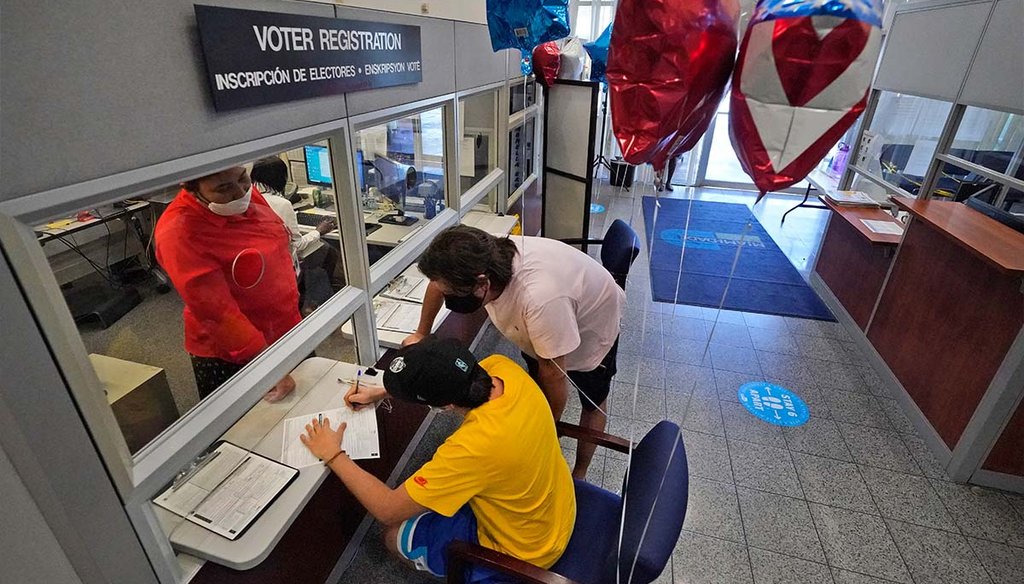Get PolitiFact in your inbox.
Judge blocks part of Trump order to require proof of citizenship for voter registration

Lucas Saez, foreground, completes his voter registration form as his father, Ramiro Saez, center rear, watches Oct. 6, 2020, in Doral, Fla. (AP)
President Donald Trump's promise to require proof of citizenship to register to vote hit a roadblock in court when a judge said Trump exceeded his authority to regulate elections.
U.S. District Judge Colleen Kollar-Kotelly in an April 24 ruling blocked the Election Assistance Commission from taking action, as directed in a Trump executive order, to modify the national voter registration form to require documentary proof of citizenship. The ruling also blocked federal departments and agencies from assessing citizenship before providing the national voter registration form to enrollees of public assistance programs.
"The President has no constitutional power over election regulation that would support this unilateral exercise of authority," Kollar-Kotelly wrote in the 120-page ruling. "The Constitution vests that power in the States and Congress alone."
Kollar-Kotelly granted a preliminary injunction to part of Trump's order, ruling in favor of the Democratic National Committee, League of Women Voters Education Fund and League of United Latin American Citizens. Separately, 19 Democratic state attorneys general filed a lawsuit and Washington and Oregon filed its own lawsuit.
Kollar-Kotelly wrote that Congress is currently debating legislation that would enact many of the changes in Trump's order. However, the president lacks the authority to "short-circuit Congress's deliberative process by executive order," the ruling said.
On April 10, the House passed the Safeguard American Voter Eligibility Act, or SAVE Act, which would require proof of citizenship to vote. The bill is unlikely to pass in the Senate.
The Trump administration is expected to appeal Kollar-Kotelly's ruling.
"Free and fair elections are the bedrock of our Constitutional Republic, and we're confident in securing an ultimate victory in the courtroom," said Harrison Fields, a White House spokesperson.
When people register to vote, they sign a form attesting under penalty of perjury that they are a U.S. citizen and eligible to vote. States can use various databases to verify citizenship, although sometimes those efforts are not foolproof.
Trump campaigned on a promise to provide proof of citizenship at the polls, one of 75 promises we are tracking on our MAGA-Meter.
Trump's March 25 executive order directed the Election Assistance Commission to take action within 30 days so that the national voter registration form would require proof of United States citizenship, such as a passport or a government-issued ID that shows citizenship and is compliant with requirements of the Real ID Act.
Only five states — Michigan, Minnesota, New York, Vermont and Washington — offer a version of Real ID that indicates whether a person is a U.S. citizen, called an enhanced driver's license. Idaho offers ID with a citizenship marker that is not an enhanced ID.
Trump's order applied only to the federal voter registration form, not state voter registration forms, said lawyers for the Campaign Legal Center and ACLU, two organizations representing plaintiffs.
We found no national data on how many people use the national form versus a state form to register to vote. However, Danielle Lang, who leads the Campaign Legal Center's voting rights team, said most voters use a state form. National groups that promote voter registration often provide the national form online or at events.
Trump has spread falsehoods about noncitizen voting for a decade.
The judge did not block all parts of Trump's executive order, such as a provision that aimed to let ballots be counted only if received by Election Day. About 17 states count a mail ballot if it is received after Election Day but postmarked on or before Election Day.
The judge also did not block the part of the order that directs Homeland Security to provide states with access to federal databases to verify citizenship of individuals registering to vote.
Our rating
Trump promised to require proof of citizenship at the polls. A judge blocked key parts of his March executive order that directed his administration to add a requirement for citizenship proof to the national voter registration form.
A bill that would achieve the same goal passed the House but is not expected to pass the Senate.
The Trump administration is expected to appeal the ruling, but for now his promise has hit a roadblock.
We rate this Stalled.
RELATED: Can voters use Real ID to satisfy SAVE Act voting rules, as Byron Daniels said? Not in 44 states.
RELATED: No, Arizona election officials aren't removing '50,000 noncitizens from voter rolls'
Our Sources
U.S. District Court Judge Colleen Kollar-Kotelly, Ruling, April 24, 2025
President Donald Trump, Executive order, March 25, 2025
White House, Fact sheet, March 25, 2025
U.S. Election Assistance Commission, Letter to state election officials, April 11, 2025
U.S. District Court, Democratic National Committee vs Trump, March-April 2025
U.S. District Court, League of United Latin American Citizens vs Executive Office of the President, March 31, 2025
Associated Press, Federal judge will wait to rule on an effort to block Trump's executive order on elections, April 17, 2025
VoteBeat, Judge expected to rule next week on challenges to Trump's executive order on elections, April 17, 2025
Cleta Mitchell, X post, April 22, 2025
Democracy Docket, Key Federal Elections Agency Moving Forward With Trump's Anti-Voting Order, April 17, 2025
States United Democracy Center, Sharing the Facts about Federal Overreach of States' Authority to Administer Elections, March 26, 2025
Campaign Legal Center, VICTORY for Voters — Unlawful, Anti-Voter Executive Order Halted, April 24, 2025
Florida Division of Elections, Voter Registration - Method and Location, March 31, 2025
Telephone interview, Danielle Lang, senior director of voting rights at the Campaign Legal Center, April 23-24, 2025
Email interview, Sophia Lin Lakin, director of the ACLU's Voting Rights Project, April 23-24, 2025
Email interview, White House spokesperson Harrison Fields, April 24, 2025
